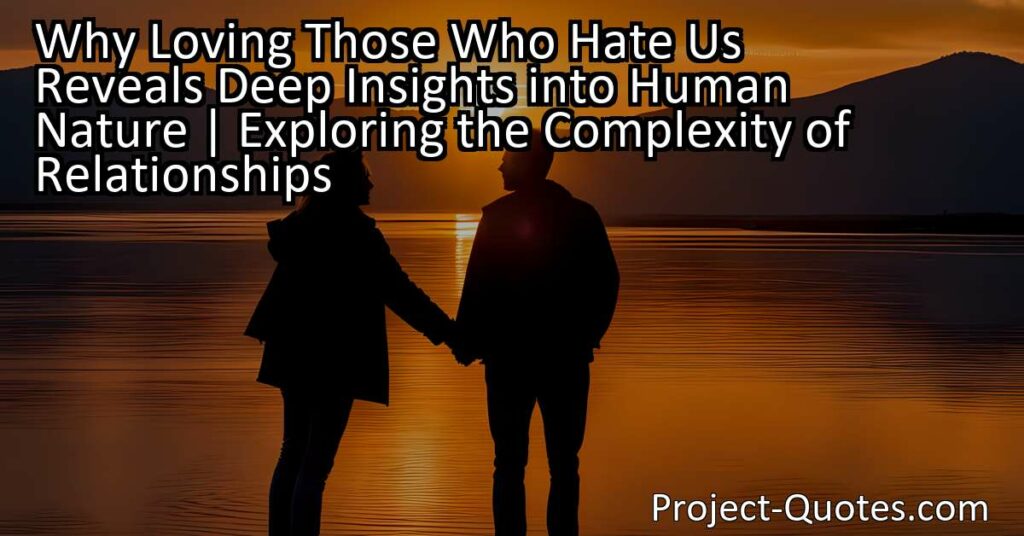We are nearer loving those who hate us than those who love us more than we wish.
Francois de La Rochefoucauld
The idea of loving those who hate us reveals deep insights into human nature and the complexities of relationships. There are valid reasons why it can be easier to connect with those who harbor negative feelings towards us, such as the clarity of their emotions, the potential for understanding and personal growth, the absence of pressure, and the desire to prove our worth. However, it is important to remember the importance of nurturing healthy relationships based on mutual understanding, love, and respect.
Table of Contents
Meaning of Quote – We are nearer loving those who hate us than those who love us more than we wish.
In life, we often come across situations where we find it easier to love those who hate us, rather than those who love us more than we desire. It may sound strange at first, but upon further reflection, this idea reveals deep insights into human nature and the complexities of relationships. In this piece, we will explore the thoughts behind this quote and delve into the reasons why we might find it easier to connect with those who harbor negative feelings towards us.
One of the primary reasons why we may find it easier to love those who hate us is the element of unpredictability that exists in these relationships. When someone hates us, their feelings and actions are very clear. We know where we stand, and this allows us to respond accordingly. On the other hand, in relationships where someone loves us more than we desire, we might feel the burden of expectation. The fear of disappointing someone who cares deeply about us can be overwhelming and may lead to a sense of unease. In contrast, when dealing with those who harbor hate, our guard is up, and we are prepared to face any challenges that come our way.
Additionally, in situations where there is animosity, we are sometimes able to find common ground or a shared understanding with those who despise us. This may seem counterintuitive, but when two people are in opposition, it often forces them to engage in deeper conversations and explore their differences. Through these discussions, it is possible to uncover underlying motivations or reasons for the hatred, which can ultimately foster a sense of empathy and connection. In contrast, relationships where someone loves us more than we wish can sometimes create an imbalance of power, resulting in a lack of deeper communication or understanding.
Another reason why we might find it easier to love those who hate us is the opportunity for personal growth and development that these relationships present. When faced with someone’s hatred, we are often forced to examine our own actions and attitudes. We question why this individual feels this way towards us and assess if there might be any validity to their sentiments. This introspection can lead to personal growth as we strive to become better individuals and identify areas where we can improve. Conversely, in relationships where someone loves us more than we desire, there is less motivation for self-reflection as we may feel complacent or take the other person’s affection for granted.
A crucial aspect to consider is the concept of unrequited love. When someone loves us more than we wish, it can be challenging to reciprocate those feelings. This can lead to guilt, frustration, and even resentment. On the other hand, when someone hates us, there is no expectation for love or affection, which eliminates any sense of obligation. This absence of pressure allows us to feel more comfortable and free in our interactions with those who dislike us. It is essential to acknowledge that while these relationships may be more straightforward, they should not be preferred over relationships based on mutual understanding, love, and respect.
Moreover, loving those who hate us can also arise from a desire to prove our worth or win over their favor. It is human nature to yearn for acceptance and validation, and when faced with someone’s animosity, we may be motivated to change their opinion or gain their affection. This desire to win over someone who hates us pushes us to exert more effort, to be better, and to show them a different side of ourselves. Conversely, in relationships where someone loves us more than we wish, we may take their affection for granted or become complacent because we know they will support us regardless of our actions.
In conclusion, the quote “We are nearer loving those who hate us than those who love us more than we wish” highlights a fascinating aspect of human nature and relationships. While it may seem contradictory at first, there are valid reasons why it can be easier to love those who harbor hate rather than those who love us more than we desire. The clarity that comes with negative emotions, the potential for understanding and personal growth, the absence of pressure, and the desire to prove our worth all contribute to this phenomenon. However, it is essential to remember the importance of nurturing healthy relationships based on mutual understanding, love, and respect. So, while we may find it easier to love those who hate us, let us not undermine the value of genuine love and connection from those who appreciate us wholeheartedly.
I hope this quote inspired image brings you hope and peace. Share it with someone who needs it today!


